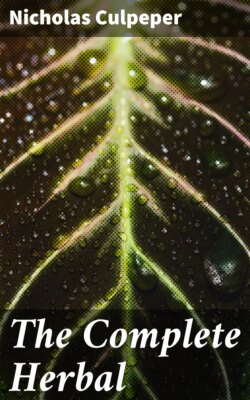Читать книгу The Complete Herbal - Nicholas Culpeper - Страница 107
На сайте Литреса книга снята с продажи.
DILL.
ОглавлениеTable of Contents
Descript.] The common Dill grows up with seldom more than one stalk, neither so high, nor so great usually as Fennel, being round and fewer joints thereon, whose leaves are sadder, and somewhat long, and so like Fennel that it deceives many, but harder in handling, and somewhat thicker, and of a strong unpleasant scent: The tops of the stalks have four branches and smaller umbels of yellow flowers, which turn into small seed, somewhat flatter and thinner than Fennel seed. The root is somewhat small and woody, perishes every year after it hath borne seed: and is also unprofitable, being never put to any use.
Place.] It is most usually sown in gardens and grounds for the purpose, and is also found wild in many places.
Government and virtues.] Mercury has the dominion of this plant, and therefore to be sure it strengthens the brain. The Dill being boiled and drank, is good to ease swellings and pains; it also stays the belly and stomach from casting. The decoction therefore helps women that are troubled with the pains and windiness of the mother, if they sit therein. It stays the hiccough, being boiled in wine, and but smelled unto being tied in a cloth. The seed is of more use than the leaves, and more effectual to digest raw and vicious humours, and is used in medicines that serve to expel wind, and the pains proceeding therefrom. The seed, being roasted or fried, and used in oils or plasters, dissolve the imposthumes in the fundament; and dries up all moist ulcers, especially in the fundament; an oil made of Dill is effectual to warm or dissolve humours and imposthumes, and the pains, and to procure rest. The decoction of Dill, be it herb or seed (only if you boil the seed you must bruise it) in white wine, being drank, it is a gallant expeller of wind, and provoker of the terms.
